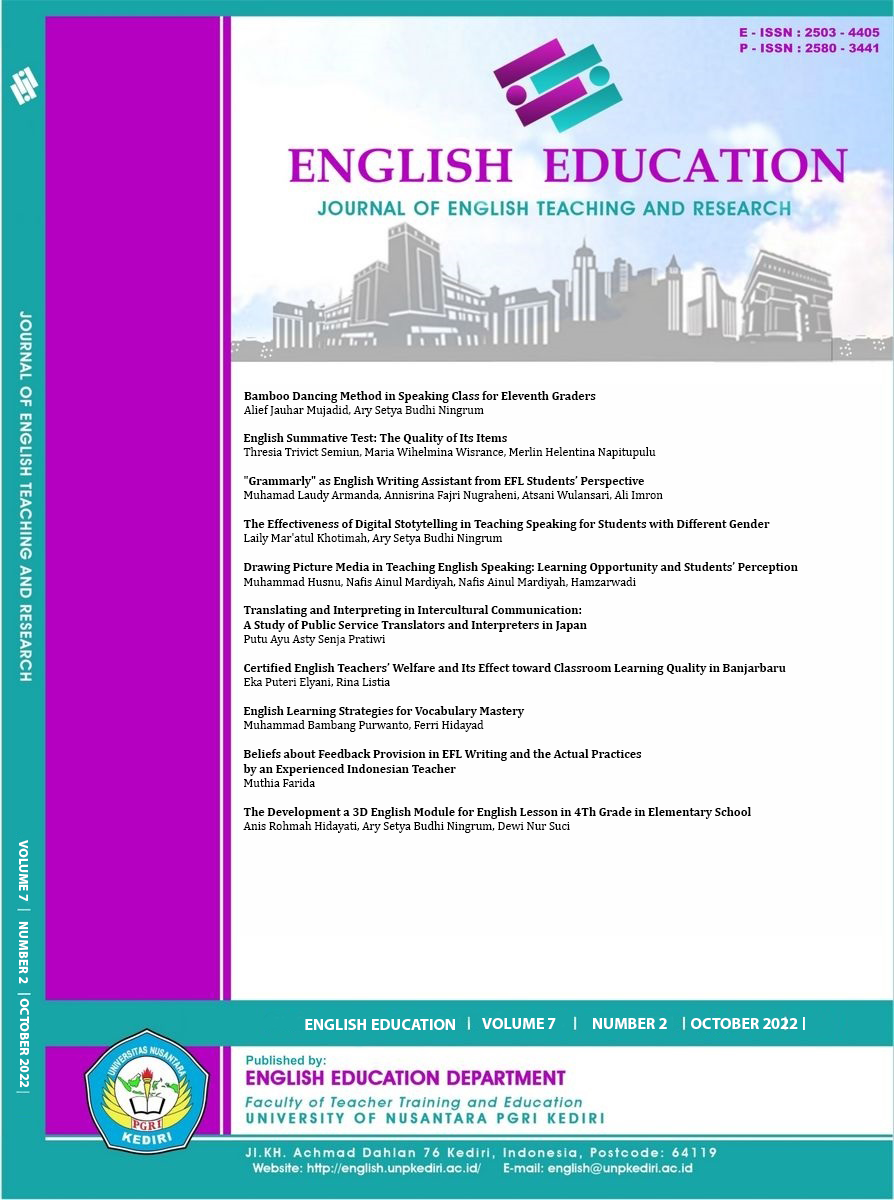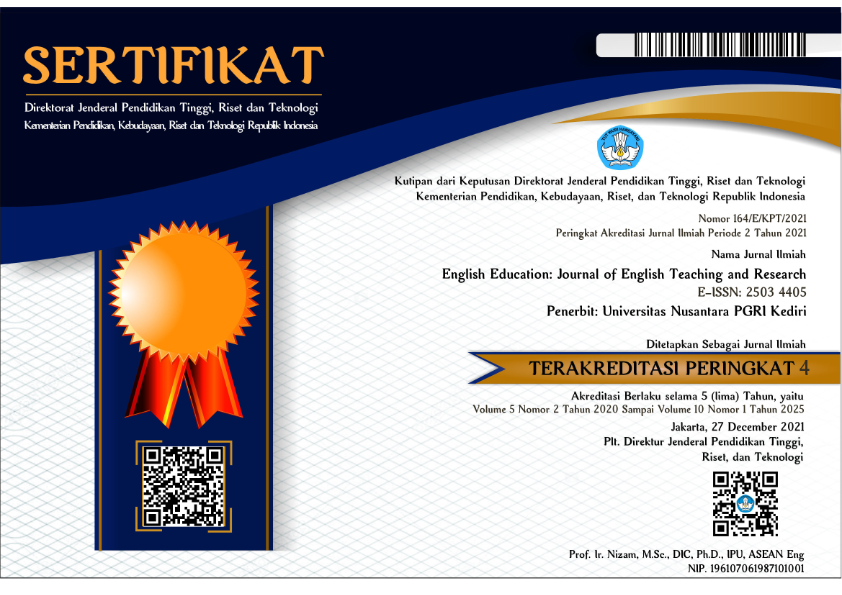English Learning Strategies for Vocabulary Mastery
DOI:
https://doi.org/10.29407/jetar.v7i2.18457Keywords:
English, Strategy, Vocabulary MasteryAbstract
This study intends to identify the categories of English vocabulary learning procedures that high school students most frequently employed. The idea of language learning techniques from Rebecca L. Oxford was used to analyze the use of English vocabulary acquisition strategies. Both qualitative and quantitative methods were used in this study. For learners in vocational schools, the qualitative technique is utilized to describe vocabulary acquisition strategies. Data on the prevalence of various English vocabulary acquisition methodologies for high school pupils are presented using the quantitative method. The Class 11 of Hospitality Students academic year 2021 SMK Telenika Palembang served as the study's data sources, and the information was gathered from the answers to questionnaires that the students had completed. The analysis found that pupils frequently use memory to learn English vocabulary. Then, the social technique is the second most often used strategy among pupils. The third technique chosen by students is the cognitive one. The fourth strategy is Compensation, followed by the fifth strategy, Metacognitive. The affective approach is the one students employ most often when acquiring English vocabulary.
Downloads
References
An, Z., Gan, Z., & Wang, C. (2020). Profiling Chinese EFL students’ technology-based self-regulated English learning strategies. PLoS ONE, 15(10 October), 1–16. https://doi.org/10.1371/journal.pone.0240094
Ang, S., Embi, M. A., & Yunus, M. M. (2017). Strategies of Successful English Language Learners among Private School Students. Jurnal Pendidikan Humaniora, 5(2), 47–57. https://doi.org/10.17977/um030v5i22017p047
Ariffin, K., Halim, N. A., & Darus, N. A. (2021). Discovering Students’ Strategies in Learning English Online. Asian Journal of University Education, 17(1), 261–268. https://doi.org/10.24191/ajue.v17i1.12695
Atmowardoyo, H., Weda, S., & Sakkir, G. (2021). Learning Strategies in English Skills used by Good Language Learners in Millennial Era: A Positive Case Study in Universitas Negeri Makassar. ELT Worldwide: Journal of English Language Teaching, 8(1), 28. https://doi.org/10.26858/eltww.v8i1.20339
Basri, N. (2020). The Effect of Applying Mind Mapping Method in Writing Descriptive Text. Langua: Journal of Linguistics, Literature, and Language Education, 3(2), 36–56. http://jurnal.stkipkieraha.ac.id/index.php/langua/article/view/82
Brown, H. D. (2003). Language assessment: Principles and classroom practices. Pearson Education.
Fraenkle, J., Wallen, N., & Hyun, H. (2012). How to Design and Evaluate Research in Education (Beth Mejia (ed.); 8th ed.). McGraw-Hill.
Galali, A., & Cinkara, E. (2017). The Use of L1 in English as a Foreign Language Classes: Insights from Iraqi Tertiary Level Students. Advances in Language and Literary Studies, 8(5), 54. https://doi.org/10.7575/aiac.alls.v.8n.5p.54
Gardner, D. (2013). Exploring vocabulary: Language in action. Routledge.
Genova, M. M. (2019). Designing an effective digital learning environment for teaching English through literature: The learning experience of Bulgarian students. Journal of E-Learning and Knowledge Society, 15(2), 120–132. https://doi.org/10.20368/1971-8829/1592
Laland, K. N. (2004). Social learning strategies. Animal Learning & Behavior, 32(1), 4–14.
Leba, S. M. R., Butarbutar, R., & Werang, B. R. (2021). Exploring the english learning strategies of an indigenous papuan student of Indonesia. Qualitative Report, 26(9), 2745–2768. https://doi.org/10.46743/2160-3715/2021.4881
Lee, J., & Heinz, M. (2016). English Language Learning Strategies Reported By Advanced Language Learners. Journal of International Education Research (JIER), 12(2), 67–76. https://doi.org/10.19030/jier.v12i2.9629
Liton, H. (2015). Examining students’ perception and efficacy of using technology in teaching English. International Journal of Education and InformationTechnology, 1(1), 11–19. http://files.aiscience.org/journal/article/pdf/70390003.pdf
Mandasari, B., & Oktaviani, L. (2018). English language learning strategies: an exploratory study of management and engineering students. Journal of English Education and Applied Linguistics, 2, 61–79.
Melvina, M., Lengkanawati, N. S., & Wirza, Y. (2020). EFL Learners’ Language Learning Strategies: Field Specialization and Gender. International Journal of Education, 13(2), 63–69. https://doi.org/10.17509/ije.v13i2.20972
Nguyen, H., & Terry, D. R. (2017). English Learning Strategies among EFL Learners: A Narrative Approach. IAFOR Journal of Language Learning, 3(1), 4–19. https://doi.org/10.22492/ijll.3.1.01
Oxford, R. L. (2016). Teaching and researching language learning strategies: Self-regulation in context. Routledge.
Pawlak, M., & Oxford, R. L. (2018). Conclusion: The future of research into language learning strategies. Studies in Second Language Learning and Teaching, 8(2 Special Issue), 525–535. https://doi.org/10.14746/ssllt.2018.8.2.15
Priyastiti, I. (2021). the Use of First Language in English As Foreign Language Classroom. Jurnal JOEPALLT (Journal of English Pedagogy, Linguistics, Literature, and Teaching), 9(2), 1–11. https://doi.org/10.35194/jj.v9i2.1594
Purwanto, M. B. (2020). Teaching prefixes as part of teaching vocabulary by using flip-a-chip to the eleventh-grade students of senior high school aisyiyah 1 of Palembang. esteem journal of English education study program, 3(1), 34–41. https://doi.org/http://dx.doi.org/10.31851/esteem.v3i1.4667
QOMARIAH, I. (2018). Islamic Senior High School Students’ Language Learning Strategies and their English Achievement. Edukasi: Jurnal Pendidikan Dan Pengajaran, 5(1), 42–52. https://doi.org/10.19109/ejpp.v5i1.2048
Resmini, S. (2019). EFL Students’ Perception Towards The Use of Bahasa. ELTIN JOURNAL, Journal of English Language Teaching in Indonesia, 7(1), 12–22.
Salikin, H., Saidna Zulfiqar Bin-Tahir, & Emelia, C. (2017). The Higher Achiever Students’ Strategies in English Learning. Modern Journal of Language Teaching Methods (MJLTM), ISSN(7(11)), 087–102. www.mjltm.org
Sugiyono. (2019). Metode Penelitian Kuantitatif, Kualitatif dan R&D (1st ed.). Alfabeta.
Suwanarak, K. (2019). Use of learning strategies and their effects on english language learning of thai adult learners. 3L: Language, Linguistics, Literature, 25(4), 99–120. https://doi.org/10.17576/3L-2019-2504-07
Tanjung, F. (2018). http://e-journal.usd.ac.id/index.php/LLT Sanata Dharma University, Yogyakarta, Indonesia. 21(June), 50–68.
Wahjuningsih, A. S. dinda hartina mega; E. (2019). The Learning Strategies Used by EFL Students in Learning English. IJEE (Indonesian Journal of English Education), IJEE (INDONESIAN JOURNAL OF ENGLISH EDUCATION)| VOL. 6 | NO.1 | 2019, 10–20. https://journal.uinjkt.ac.id/index.php/ijee/article/downloadSuppFile/12111/1718
Yulianti, D. B. (2018). Learning strategies applied by the students in writing English text. Journal on English as a Foreign Language, 8(1), 19. https://doi.org/10.23971/jefl.v8i1.583
Downloads
Published
Issue
Section
License
Authors who publish with this journal agree to the following terms:
- Copyright on any article is retained by the author(s).
- The author grants the journal, the right of first publication with the work simultaneously licensed under a Creative Commons Attribution License that allows others to share the work with an acknowledgment of the work’s authorship and initial publication in this journal.
- Authors are able to enter into separate, additional contractual arrangements for the non-exclusive distribution of the journal’s published version of the work (e.g., post it to an institutional repository or publish it in a book), with an acknowledgment of its initial publication in this journal.
- Authors are permitted and encouraged to post their work online (e.g., in institutional repositories or on their website) prior to and during the submission process, as it can lead to productive exchanges, as well as earlier and greater citation of published work.
- The article and any associated published material is distributed under the Creative Commons Attribution-ShareAlike 4.0 International License








 Article template
Article template



